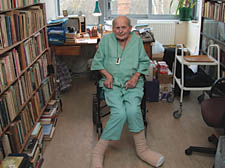|
|
 |
| |

Fred Grubb at his home in Henderson Court |
A shot in the leg for poetry?
When Fred Grubb accidentally put a bullet in his commanding officer, it triggered his move into a life of poetry that had long been calling to him, writes Simon Wroe
EVEN as a young soldier, before he made the mistake of shooting his general in the foot, literature was in Fred Grubb’s blood.
The bullet lodged above his superior’s ankle, potentially a court-martial offence, merely convinced him to follow his passion sooner rather than later. For the teacher, poet and critic that Grubb has become, it was quite a lucky shot, although the general might not agree.
Grubb never fitted into the army. While his peers were studying their rifle instruction manuals, he was reading Auden and MacNeice’s Letters from Iceland, or Yeats and Elliot. His popularity in the Highland Light Infantry was nil, and when his letter about a production of Bartholomew Fair was published in The Picture Post it confirmed what his fellow squaddies had long suspected: Grubb was one of those arty southern types.
Not that Grubb, now a 78-year-old in frail health living in supported housing in Hampstead’s Henderson Court, would prefer that label. His life and work are characterised by a wilful avoidance of art for art’s sake and the pretentious pitfalls of the poetic genre.
He is a post-Romantic but also a socialist; a man who, in the words of his fellow writer, the late Philip Hobsbaum, “seeks to subjoin… Grecian urns to the soiled crockery of humanity as a means of making it whole”.
The lyrical and the prosaic often meet in his poems with disarming results. In The Pyrenees (1977), it feels as if Grubb is playing with the reader’s preconceived notions of poetry, lulling them into an analogy only to debunk it:
A waterfall in very early light,
Like tangled hair, their seeming innocence
Points through sound and slope and perspective
To the enormity of light… this is
Not a metaphor of anybody’s life;
Least of all, yours.
At other times, he rails against the arts scene, proclaiming that he “neither owns, attends, hears nor sees telly, radio, discs, cinema, theatre, concerts, galleries, newspapers, junkets, house, or car [and] dislikes all ornaments”.
He writes in Incantation Against a Type of Critic: “You see, I’m not artistic. One has one’s problems, one must make ends meet / And unless art has beliefs and meaning, Is serious – or amusing – it can go to hell.”
Yet for all Grubb’s vitriol, he remains a part of that literary world. Indeed, he may be one of the last survivors of the famous 1960s Hampstead coterie of writers, actors and critics. Grubb was a tenant in Peter Vansittart’s “last of the rooming houses”, a “thoroughly broken down and dilapidated house” in Upper Park Road; and a regular face at William and Hetta Empsom’s all-night parties at their studio house in Haverstock Hill, frequented by literary critic I A Richards and the celebrity tramp Bronco John, among others.
“Vansittart charged peppercorn rents; he just wanted to write his historical novels and he didn’t want to be bothered,” Grubb remembers.
“[Empsom] used to have these come all ye parties on Saturday evenings which Peter didn’t go in for. William was very difficult to talk to; he was brilliantly intellectual and had hardly any small talk. The reason for the parties was pure altruism. At about two in the morning he would disappear into the attic, presumably to write his latest critical masterpiece, and the rest of us would carry on till morning.”
Before Hampstead, at Cambridge, where he went after his military tribunal and subsequent oblique posting to the Welsh borders, Grubb knew Ted Hughes and was tutored by the hugely influential critic FR Leavis, though he found his teaching style “so dogmatic that I swiftly became a rebel”.
Frederick Grubb was born “slightly prematurely” in Highgate in 1930. During the Second World War his father, who had a job in the ministry of information, refused to have the family evacuated, and Grubb remembers the flying bombs and doodlebugs well. He boarded at Haileybury, where he was “thoroughly bored, although I wouldn’t say with the typical literary person’s unhappiness – I was simply bored.”
After his schooling he went into education, working as a teacher at the Open University until Thatcher cut funding, teaching English in Cairo, Morocco, Tunisia and Saudi Arabia. He has written several volumes of poetry, and edited and championed the work of several others – Michael Roberts and Arthur Jacobs to name a few. His critical book, A Vision of Reality: A Study of Liberalism in 20th century verse, published in 1965, cast light on then lesser-known poets such as Philip Larkin and Peter Porter.
In his clinical lodgings at Henderson Court – set aside from the thousands of books arranged in chronological order from the Classics to Rilke – a mountain ice-axe stands propped against a large red Amaryllis. Grubb found the axe on one of his many treks through the Pyrenees. His health prevents him from visiting the mountains now, but they often visit him. On those occasions, his poetry finds peace.
Walk on: from miles away, the range
With a tinge of early, angry snow
Not picturesque, nor dramatic
Just old and rather odd
Slightly eccentric in the autumn haze
Where anger and pity are still.
|

|
 |
Your comments:
The Lenkiewicz exhibition is stunning from the remarkable St Eustace sculpture to the drawings featuring unicorns, tigers and Elvis! The skeletons and skulls were my particular favourite along with the octopus drowning the Titanic. The surroundings are fabulous; the Pite architecture lends itself so well to the mood. I admit I have a particular fondness for
the building having worked there for 26 years.
J. Trend-Hill
|
|
 |
|

